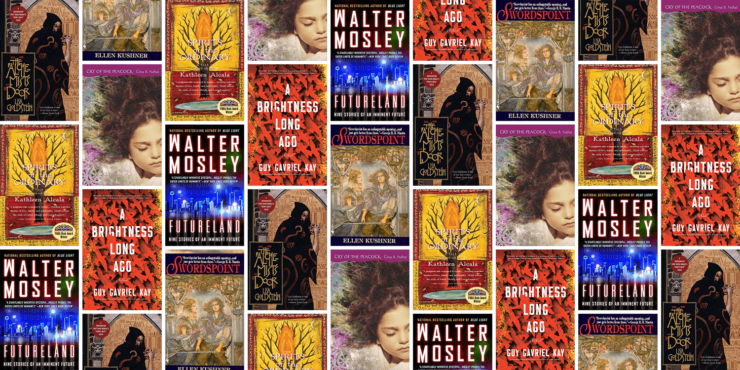As peoples, we Jews constitute a multitude of communities that is as numerous and infinitely varied in their backgrounds, religious practice, cultural mores, ethnicities, and everything else. We are communities, not a community; peoples, not a people. As Rabbi Angela Burchdahl told Haaretz, “Whoever decided that they want to flee oppression and go to a place where they could have freedom and where they could serve a God that redeems them—that is what it means to be a Jew.”
Our mythologies are as diverse as our own origins, spanning every corner of the world. With that in mind, let’s highlight some must-read sci-fi and fantasy novels by Jewish authors from many different backgrounds, ones that finds characters and authors come to terms with individual mythologies and heritages.
The Alchemist’s Door by Lisa Goldstein
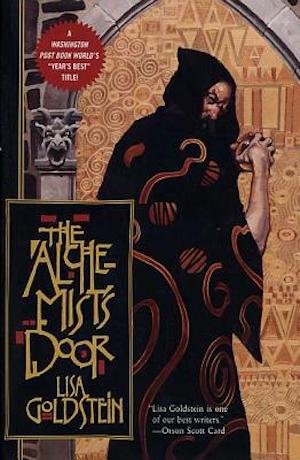
Lisa Goldstein spins a spellbinding tale of historical fantasy, intertwining the tales of two real polymaths and injecting mystical elements. When Queen Elizabeth I of England’s alchemist John Dee, a Welsh alchemist, accidentally summons a demon, he flees across Europe, ending up in Prague. There, he meets another real-life polymath: Rabbi Judah Loew of Prague, the man who created the Golem (traditionally, a clay man brought to life to defend Jews against persecutors, a muddy Superman). But as Dee and Lowe battle with their own connections to the supernatural, neither demonstrates full mastery over angels, demons, or other magical forces—Rabbi Loew’s Golem begins to develop a will of its own, for example—readers remain unsure whether or not both men can save their lives and connections to the Otherworld.
Goldstein brings together two titans of the sixteenth century and watches as their respective mythologies collide—and disrupt the world around them. Loew takes his rightful place as a formidable scholar on par with the already well-known Dee, showing that Jews, too, dabbled in the mystical and built rich mythologies that exist to this day.
Cry of the Peacock by Gina Nahai

A Jew of Iranian descent, Gina Nahai tells the story of a centenarian named Peacock—and, indeed the multigenerational struggles of Jews in Persia—in this well-crafted novel. The story opens with Peacock defiantly flashing her brilliant clothes like her namesake’s feathers while in a women’s prison; she confounds the mullahs and guards in every way, from her age and her lavish adornment to her refusal to divulge intimate details of her life.
Peacock inhabits a place between history—she is imprisoned at a pivotal point in Iranian history—and mythology—she is 116 years old. She crafts lavish stories in her memory like Shahrazad, much as Nahai herself collected tales while writing the book. Memories of her prophetess grandmother, Esther, weave in allusions to legends of the Jewish Queen Esther, wife of the Achamenid king Ahasuerus, identified with historical monarch Xerxes) with the rise and fall of Iranian dynasties and the Iranian grand epic, the Shahnameh.
Futureland by Walter Mosley
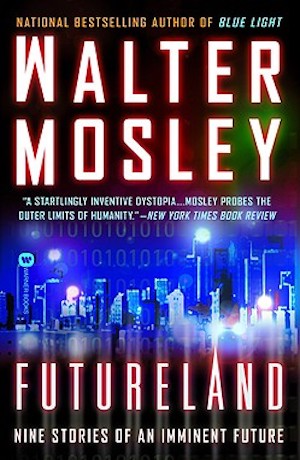
Prodigiously talented author Walter Mosley is best known for his Easy Rawlins mystery series, but he’s also extended his purview to science fiction. Mosley’s 2001 anthology, Futureland, contains nine interlinked short stories that nimbly navigate questions of identity, prejudice, and tyranny in the United States at some point in the near future.
Particularly compelling is “The Electric Eye”. PI Folio Johnson is hired by a Neo-Nazi to investigate the deaths of several “International Socialists,” members of a fascist group nicknamed the “Itsies.” When interviewing one Mingus Black, a man who knows the “Itsies,”, Folio asks how Mingus could pal around with fascists. Mingus replies smoothly, “They ain’t worried about us, man. There’s a place for all the races up in there. All except Jews and Gypsies.” Folio volleys back a sharp question—“Then why don’t you belong?” The extended conversation between Folio and Mingus touches on belonging, isolation, and justice—and where Folio and Mingus, each associating with fascists in their own way, find themselves on that spectrum.
Spirits of the Ordinary by Kathleen Alcalá
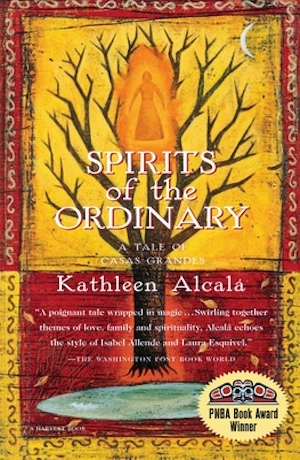
Mexican-American writer Kathleen Alcalá discovered a few years ago that she is likely descended from “crypto Jews.” These were Jews persecuted for their faith who ostensibly converted to Catholicism but continued to covertly practice Judaism; captivated, Alcalá formally converted to Judaism. She draws from her own journey in Spirits, which tells the story of Zacarías. In the 1870s, Zacarías and his family secretly practice Judaism in northern Mexico, but he’s more focused on finding gold than he is able to manage his challenging family. Complex dynamics of faith play out as Zacarías goes for the gold, leaving his faith and clan behind…or does he? Prophets and biblical imagery factor into his sometimes-prophetic dreams and those of his mother, Mariana, a woman with foretelling abilities of her own. Alcalá beautifully intertwines questions of identity, individuality, and ambition with this unique tale.
Swordspoint by Ellen Kushner
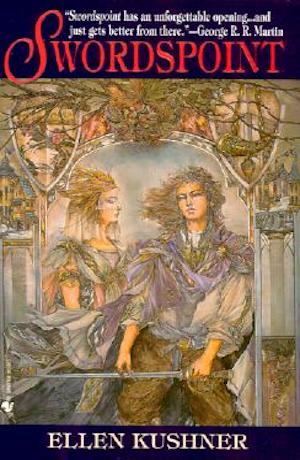
This fan-favorite novel introduces a beautifully-constructed world focused on the adventures and misadventures of soulmates Richard and Alec. A sellsword, ruthless Richard finds himself embroiled in court intrigue and a world of secrets he never imagined…and questions of whether true love can triumph in a world full of political schemes and plots.
Richard and Alec’s love story is extraordinary compelling; their bond is tested not by magic, but by questions of class. Richard is the interloper, Alec the established aristocrat, but both must confront questions about their respective places in society—where “should” they be, versus where they want to be—to be together. Kushner’s beautiful writing makes the story come alive; her lush descriptions are second to none. Rightfully regarded as a master of her literary craft, Kushner creates two heroes who question their places in society and make the reader fall in love with them as their relationship is tested again and again.
A Brightness Long Ago by Guy Gavriel Kay
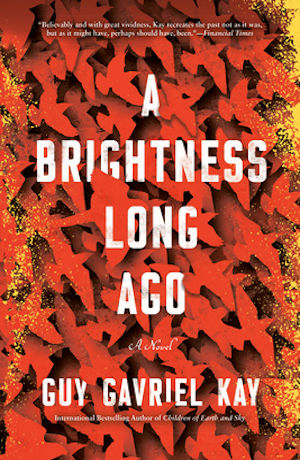
Guy Gavriel Kay has long earned acclaim as a master of historical fantasy, dexterously weaving matters of faith, politics, and love together with settings closely modeled on the real world. Many of his books, including 2019’s Brightness, are set at different chronological points in the same Mediterranean-inspired world. Set in a world inspired by Renaissance Italy, this book sees Kay navigate numerous questions of how faith and politics interact, as the wheel of fortune rises and falls. The fates of others seem almost inconsequential to our main characters, but such is the nature of human vanity.
Though the Kindath (analogous to Jewish people) don’t play as big a role in Brightness as they do in other Kay novels, such as The Lions of Al-Rassan, they linger as a disenfranchised group. The main characters don’t necessarily give them much thought, an uncomfortable behavioral pattern that forces us to question the way we might have behaved in similar circumstances. For example, the healer Jelena is faced with war in her city of Dondi. She has never had to live through a conflict of this magnitude before, and when Dondi’s council begins to expel the beggars, homeless, and Kindath, she shrugs it off.
After all, Jelena muses, “there weren’t many of those,” so not many Kindath would be harmed. And, as one Kindath tells her, cities expel “unbelievers” in times of crisis and siege—it’s simply practical policy to feed one’s own people rather than the “other” when there’s not enough food to go around. And when Jelena ends up in Varena (analogous to Ravenna), she is forced to confront interfaith living…or so it seems. There are Jaddites (Christians), Asharites (Muslims), Kindath, and more—but she retreats into her own “Jaddite world,” her own bubble, because it is comfortable and familiar in times of political upheaval.
A public historian, Carly Silver has written for BBC News, History Today, Smithsonian, Atlas Obscura, The Atlantic, Narratively, ThoughtCo/About.com (for which she served as the ancient/classical history expert), Biblical Archaeology, Eidolon, All That’s Interesting, and other publications. She works as an associate editor at HarperCollins and resides in Brooklyn, New York.










